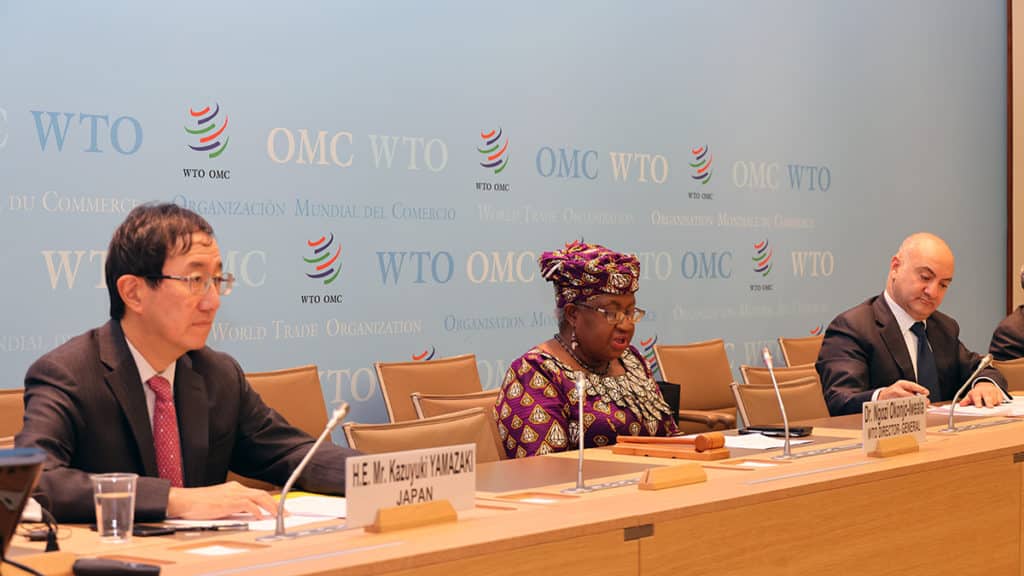Los coorganizadores de las negociaciones sobre el comercio electrónico se felicitan de los progresos considerables alcanzados en las negociaciones

En una declaración publicada el 14 de diciembre, los Ministros de Australia, el Japón y Singapur, países coorganizadores de las negociaciones sobre el comercio electrónico celebradas en la OMC, se han felicitado de los progresos considerables alcanzados en el marco de la iniciativa.
(de momento sólo en inglés)
Australia’s Trade, Tourism and Investment Minister Dan Tehan, Japan’s Minister for Foreign Affairs Yoshimasa Hayashi and Minister of Economy, Trade and Industry (METI) Koichi Hagiuda, and Singapore’s Minister for Trade and Industry Gan Kim Yong highlighted the good convergence achieved in eight articles so far.
- «Thanks to the good progress achieved so far, we’re on track to achieve convergence on the majority of issues in the negotiations by the end of 2022. Australia, Japan and Singapore are committed to driving negotiations towards this objective,» said Minister Tehan.
- Foreign Minister Hayashi of Japan said: «Although the 12th Ministerial Conference has been postponed, this negotiation on e-commerce remains one of the key areas for the WTO as an organization that promotes global trade. I believe it is important to continue delivering results from this negotiation, aiming for further progress in the next year. Japan has been advocating the concept of “Data Free Flow with Trust (DFFT)” and sees significant value in realizing this concept. While maintaining inclusiveness for participating members, Japan, as a co-convener of the initiative, will continue to accelerate the negotiation to achieve a high-standard outcome, including on the rules of free flow of data.»
- METI Minister Hagiuda added: «We welcome the substantial progress made in the negotiations over the past three years, and will continue to lead them in order to secure convergence on the majority of the remaining issues by the end of 2022. As the world becomes increasingly connected through digitalization, digital trade is making people more affluent the world over. The WTO has many members, so providing it with rules on digital trade that materialize «Data Free Flow with Trust» (DFFT) will make business more predictable and stable. This will in turn promote further digital trade. With the aim of achieving early results, we will work to accelerate and add further impetus to the negotiations.»
- Singapore’s Minister Gan said: “Digital trade is becoming a key mode of doing business today. The initiative will provide a stable regulatory environment for digital trade by enhancing rules and streamlining regulations. The initiative, which involves 86 members, will also contribute towards bridging the digital divide and encourage the adoption of digitalisation, which positions our economies well to harness the benefits of new opportunities in the digital economy. Singapore, together with our fellow co-convenors Australia and Japan, will intensify our efforts to steer the initiative and forge convergence on major issues by end-2022.”
The ministers said the outcomes already achieved in important areas of the negotiations would deliver important benefits, including boosting consumer confidence and supporting businesses trading online. They said they would arrange the initiative’s work programme to secure convergence on the majority of issues by the end of 2022.
WTO Director-General Ngozi Okonjo-Iweala said the progress achieved by negotiators from the 86 WTO members participating in these negotiations would bring important benefits to smaller businesses and to women entrepreneurs.
«The work undertaken promises more stability and predictability for consumers and businesses in a fast-growing sector of the digital economy. The pandemic has highlighted the importance of e-commerce as a tool for inclusion, helping small business access international markets, particularly businesses headed by women. I encourage the initiative to continue to keep its doors open for other members of the WTO to join and to continue discussing development issues necessary to bridge the digital divide,» she said.
In their statement, the co-convenors noted support by initiative participants for the continuation of the multilateral e-commerce moratorium. They said they considered it crucial that the initiative make permanent among participants the practice of not imposing customs duties on electronic transmissions.
The co-convenors emphasised the importance of supporting the engagement of developing members and least-developed country (LDC) members in the initiative, including implementation of commitments. They said they would continue to deepen the discussion on capacity-building options and support for implementation for developing members and LDC members in 2022.
The full statement is available here.















